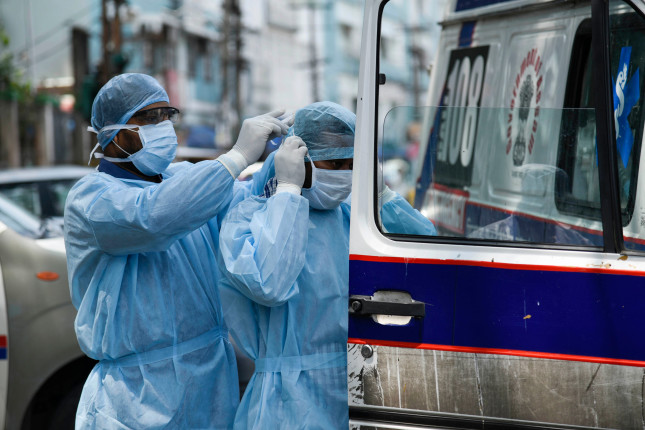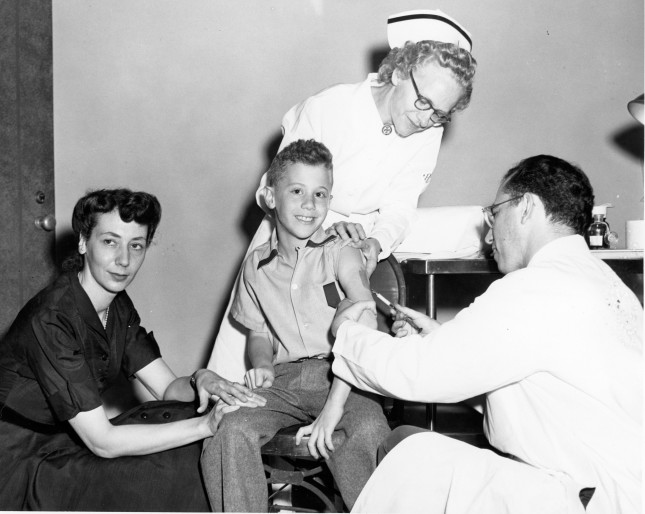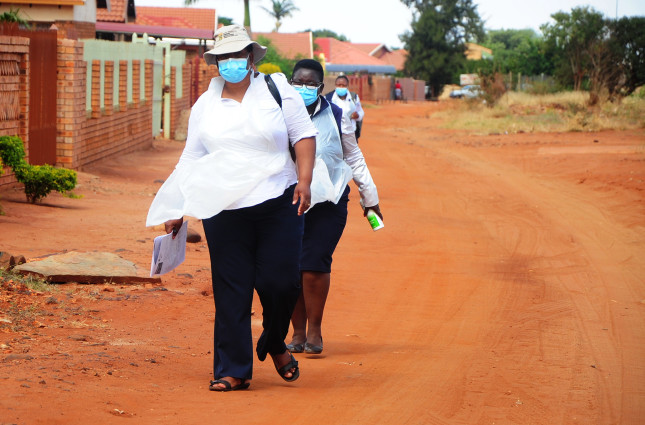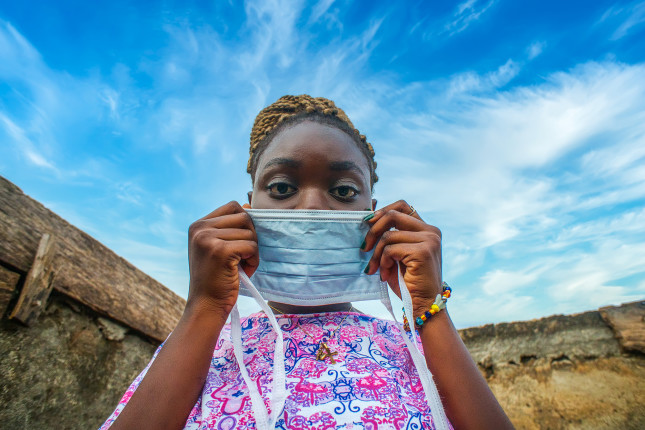-
Reducing the Risk of Pandemic Disease Threats Through Multisectoral Action
›
“No single individual, discipline, sector or ministry can preempt and solve complex health problems.”
The COVID-19 pandemic underscores the importance of multisectoral action to contain and mitigate the effects of the virus. Presently, during crisis conditions or “war time,” in the language of outbreak experts, multisectoral efforts—including actions traversing health, education, labor, finance and other sectors—are readily apparent. But when policymakers perceive crises have passed, during so-called “peacetime,” governance structures that enable multisectoral collaboration tend to diminish or languish.
-
Dr. Raj Panjabi on the Importance of Community-Based Health Systems in Pandemic Response
› If there’s anything about responding to an epidemic, it’s that speed matters, and so does investing in people closest to the problem, said Dr. Raj Panjabi, Assistant Professor of medicine at Harvard Medical School and CEO of Last Mile Health, in this week’s Friday Podcast. The latter, he said, is the root of resilience.
If there’s anything about responding to an epidemic, it’s that speed matters, and so does investing in people closest to the problem, said Dr. Raj Panjabi, Assistant Professor of medicine at Harvard Medical School and CEO of Last Mile Health, in this week’s Friday Podcast. The latter, he said, is the root of resilience. -
The Importance of Community Trust to Combat COVID-19 Vaccine Hesitancy
› “Vaccine hesitancy is to be expected in a normal circumstance—it’s very different from being what we call ‘anti-vaccine,’” says Dr. Rahul Gupta, Senior Vice President and Chief Medical and Health Officer at March of Dimes, in this week’s Friday Podcast. He spoke at a recent Wilson Center event on ongoing efforts to develop and deliver a COVID-19 vaccine, co-sponsored by the University of Pittsburgh, March of Dimes, and the Jonas Salk Legacy Foundation.
“Vaccine hesitancy is to be expected in a normal circumstance—it’s very different from being what we call ‘anti-vaccine,’” says Dr. Rahul Gupta, Senior Vice President and Chief Medical and Health Officer at March of Dimes, in this week’s Friday Podcast. He spoke at a recent Wilson Center event on ongoing efforts to develop and deliver a COVID-19 vaccine, co-sponsored by the University of Pittsburgh, March of Dimes, and the Jonas Salk Legacy Foundation. -
Building Bridges: What It Will Take to Develop a Safe, Effective COVID-19 Vaccine
›
“I think we have to remember not to forget what these diseases did in the past and to actively collaborate, to work with each other, and to communicate well that vaccines work,” said Dr. Paul Duprex, Director of Pitt’s Center for Vaccine Research and Professor of Microbiology and Molecular Genetics at a recent Wilson Center event on the development of a COVID-19 vaccine, co-sponsored by the University of Pittsburgh (Pitt), March of Dimes, and the Jonas Salk Legacy Foundation.
-
In Sub-Saharan Africa, Community Health Workers Support Sustainable Health Systems and COVID-19 Response
›
“If there’s one message, it’s health systems need to be resilient, agile, and equitable,” said Uzma Alam, a researcher at the Africa Institute for Health Policy Foundation and Senior Program Officer of the Africa Academy of Sciences. “No one person, no one community, no one minority can be left behind. After all, your health system is as agile, as resilient as your weakest link.” She spoke at a recent Wilson Center event co-sponsored with the Population Institute, “Lessons from Africa: Building Resilience through Community-Based Health Systems.” The event focused on how locally led interventions improved the resilience and responsiveness of health systems in sub-Saharan Africa.
-
The Resurgence of Indigenous Midwifery in Canada, New Zealand, and Mexico
› Globally, Indigenous women experience worse maternal health outcomes than non-Indigenous women. In the United States, the risk of maternal death is twice as high for Native women than for white women, while in Australia the risk is four and a half times higher. This week’s Friday Podcast highlights remarks from a recent Wilson Center event with the United Nations Population Fund (UNFPA) and the International Confederation of Midwives about Indigenous midwifery.
Globally, Indigenous women experience worse maternal health outcomes than non-Indigenous women. In the United States, the risk of maternal death is twice as high for Native women than for white women, while in Australia the risk is four and a half times higher. This week’s Friday Podcast highlights remarks from a recent Wilson Center event with the United Nations Population Fund (UNFPA) and the International Confederation of Midwives about Indigenous midwifery. -
The State of Sexual and Reproductive Health and Rights: A Conversation with Dr. Zara Ahmed
› “Unintended pregnancy and abortion are reproductive health experiences shared by tens of millions of people around the world, irrespective of personal status or circumstance. What differs though are the obstacles,” said Dr. Zara Ahmed, Associate Director of Federal Issues at the Guttmacher Institute in this week’s Friday Podcast. Research from the Guttmacher Institute on sexual and reproductive health (SRH) found that in 2018, there were 121 million unintended pregnancies globally, and of those, 61 percent ended in abortion. About half of these abortions were in unsafe conditions and led to approximately 23,000 preventable pregnancy related deaths, said Ahmed.
“Unintended pregnancy and abortion are reproductive health experiences shared by tens of millions of people around the world, irrespective of personal status or circumstance. What differs though are the obstacles,” said Dr. Zara Ahmed, Associate Director of Federal Issues at the Guttmacher Institute in this week’s Friday Podcast. Research from the Guttmacher Institute on sexual and reproductive health (SRH) found that in 2018, there were 121 million unintended pregnancies globally, and of those, 61 percent ended in abortion. About half of these abortions were in unsafe conditions and led to approximately 23,000 preventable pregnancy related deaths, said Ahmed. -
The Global Impact of COVID-19 on Women and Girls
›
“As we face a global pandemic that has taken the lives of more than 800,000 people as of right now around the world, we certainly have to recognize the particular impacts that that has had on women and girls and their lives,” said Rep. Chrissy Houlahan (D-PA), at a recent event hosted by CARE and UNFPA about the global impact of COVID-19 on women and girls. While women make up 70-80 percent of frontline healthcare workers globally, they have also been disproportionately affected during the pandemic by increased rates of gender-based violence, lack of access to sexual and reproductive healthcare, and economic and food insecurity.
Showing posts from category global health.


 If there’s anything about responding to an epidemic, it’s that speed matters, and so does investing in people closest to the problem, said Dr. Raj Panjabi, Assistant Professor of medicine at Harvard Medical School and CEO of Last Mile Health, in this week’s Friday Podcast. The latter, he said, is the root of resilience.
If there’s anything about responding to an epidemic, it’s that speed matters, and so does investing in people closest to the problem, said Dr. Raj Panjabi, Assistant Professor of medicine at Harvard Medical School and CEO of Last Mile Health, in this week’s Friday Podcast. The latter, he said, is the root of resilience. “Vaccine hesitancy is to be expected in a normal circumstance—it’s very different from being what we call ‘anti-vaccine,’” says Dr. Rahul Gupta, Senior Vice President and Chief Medical and Health Officer at
“Vaccine hesitancy is to be expected in a normal circumstance—it’s very different from being what we call ‘anti-vaccine,’” says Dr. Rahul Gupta, Senior Vice President and Chief Medical and Health Officer at 

 Globally, Indigenous women experience worse maternal health outcomes than non-Indigenous women. In the United States, the risk of maternal death is
Globally, Indigenous women experience worse maternal health outcomes than non-Indigenous women. In the United States, the risk of maternal death is  “Unintended pregnancy and abortion are reproductive health experiences shared by tens of millions of people around the world, irrespective of personal status or circumstance. What differs though are the obstacles,” said Dr. Zara Ahmed, Associate Director of Federal Issues at the
“Unintended pregnancy and abortion are reproductive health experiences shared by tens of millions of people around the world, irrespective of personal status or circumstance. What differs though are the obstacles,” said Dr. Zara Ahmed, Associate Director of Federal Issues at the 


